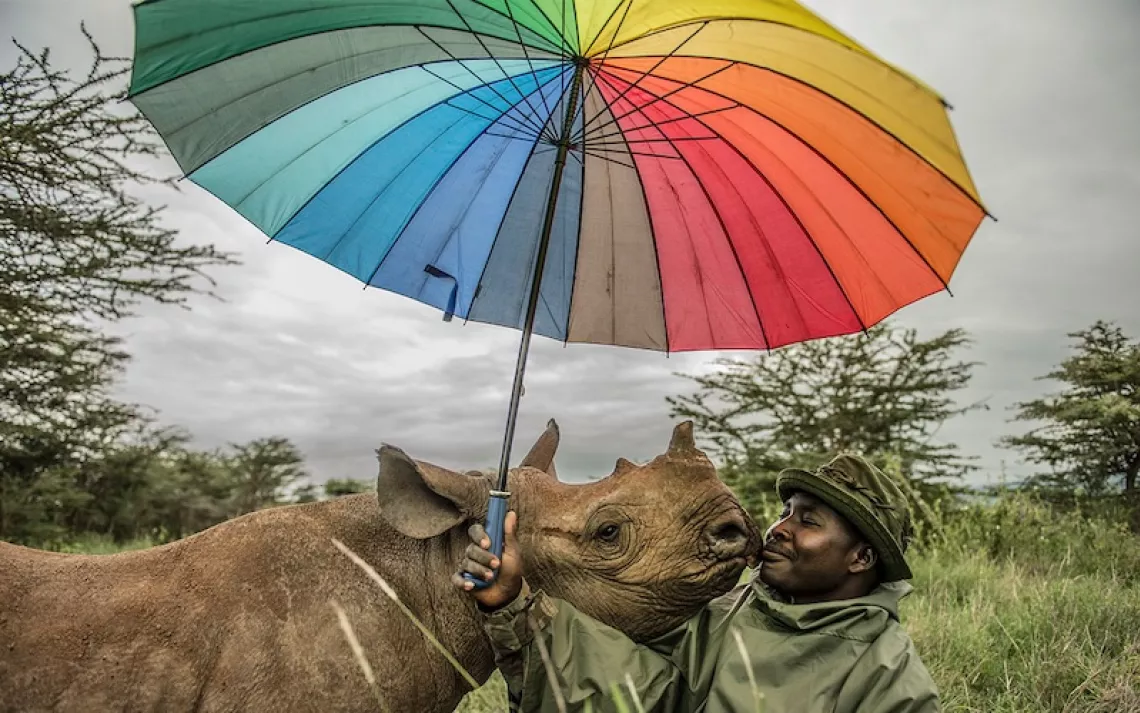The Global Gag Rule Puts a Choke Hold on Contraception
The Trump administration leaves vulnerable women with few choices

Brenda Akwero received an IUD at a Marie Stopes clinic in Parabongo, Uganda. | Photo by Alex Potter
In rural Uganda, girls marry young, villages are far from clinics and hospitals, contraception is hard to get, and the babies come often. A quarter of women give birth by age 19, and half of all pregnancies are unintended.
But in some of the hardest-to-reach places, nurses and midwives arrive by truck, loaded with an array of contraceptives. They offer the women choices: Do they want babies? How many? How often?
"The average Ugandan woman has no say in when she has sex," says Carole Sekimpi, Uganda country director for Marie Stopes International, one of the world's leading family-planning organizations, based in London. "Her husband comes home, and if he wants to have sex, she has sex." She may have no way to reach a clinic for condoms, pills, an implant, an IUD, or an injection. So Marie Stopes mobile teams go to meet her and other women beneath tents and trees or inside their homes.
If the teams don't come or don't come on time, there is trouble. Implants can't be removed when couples want a child, and short-term contraceptives run out. Marital discord, unplanned pregnancies, and an increase in unsafe abortions and maternal deaths follow.
That's exactly what happened—in Uganda and across the globe—after President Trump, on his first day in office, reinstated what's known as the global gag rule. First implemented by Ronald Reagan in 1984, it prohibits foreign organizations that receive US financial assistance from providing abortion services, referrals, counseling, or advocacy. Since then, it's been subject to political ping-pong: repealed under Democratic administrations and restored by every Republican president.
This time, Trump upped the ante. While previous iterations of the policy applied only to US family-planning funds, Trump's version applies to almost all US global health aid. Programs dealing with child nutrition, water and sanitation, and the prevention of HIV/AIDS, tuberculosis, malaria, and other infectious diseases are now subject to the gag rule. All told, this affects the recipients of $8.8 billion in US aid. Organizations must weigh their options: take US dollars and comply with the gag rule or lose funding and face the closure of their clinics and programs—including those that have nothing to do with abortion. In March 2019, Secretary of State Mike Pompeo further interpreted the rule to include subcontractors and partner organizations working with any group receiving US health aid.
The effect of the gag rule, ironically, is to increase abortions and suffering. One study, published in the Lancet, followed three-quarters of a million women in 26 countries over 20 years and found that during previous impositions of the rule, abortions rose by 40 percent in the most affected regions.
Marie Stopes continues to offer abortion services, a policy that has left it with a $50 million funding gap. Its Zimbabwe program had to halve its sites from 1,200 to 600; outreach teams in Uganda went from 35 to 30. The organization estimates that 1.4 million women and girls globally will lose Marie Stopes's services. By its calculations, that equates to 1.8 million unintended pregnancies, 600,000 unsafe abortions, and 4,600 avoidable maternal deaths.
Vanessa Rios, an International Women's Health Coalition program officer and the author of a global assessment of Trump's gag rule, cites an example from a Kenyan clinic that complied with the policy and stopped referring clients to abortion services; two women subsequently died after unsafe abortions. "This policy is quite literally killing young women," she says.
Sekimpi and other aid workers also talk about a chilling effect that now permeates public discussions between compliant and noncompliant groups. "Many a time, you get to a point where the US government-funded people say, 'You know what? I think you guys need to stop this conversation here, or perhaps we need to step out of the room,'" Sekimpi says.
Beyond the human suffering, advocates say, the gag rule ultimately impedes everything from poverty reduction to environmental conservation—which depend on healthy women. Research shows that two of the top 10 most effective responses to climate change are investments in girls' education and voluntary family planning. "Combined, they reduce carbon emissions more than any other solution identified," says Seema Jalan, executive director of the UN Foundation Universal Access Project. "When girls and women are stripped of their right to control their reproduction, we are also grinding to a halt some of the most effective interventions against climate change."
Sekimpi sees one small positive to Trump's global gag rule: Her own organization, she says, has grown more frugal and efficient. "When you're in a difficult situation, you learn. You think better," she says. And it found other funders to fill some gaps. "When the US government grant ended, multiple donors came in, and we limped on for a while."
Aid groups are pinning their hopes on a more-long-term solution. Earlier this year, US lawmakers introduced the Global Health, Empowerment, and Rights Act (a.k.a. the Global HER Act), which, if passed, would permanently repeal the global gag rule and prevent future administrations from easily reimposing it via executive order. Of course, the bill's fate will depend on which party is in power after the 2020 election.
This article appeared in the November/December 2019 edition with the headline "Choke Hold on Contraception."
This article was funded by the Sierra Club's Gender, Equity, and Environment program.
 The Magazine of The Sierra Club
The Magazine of The Sierra Club



